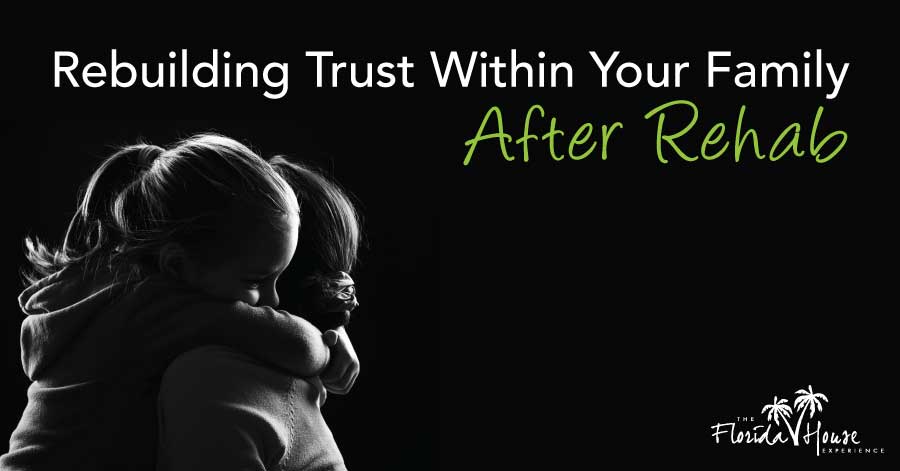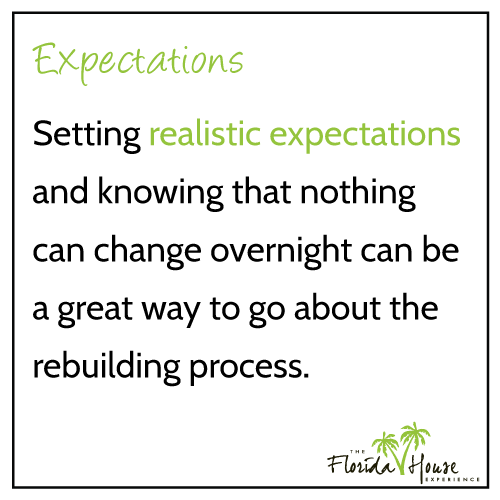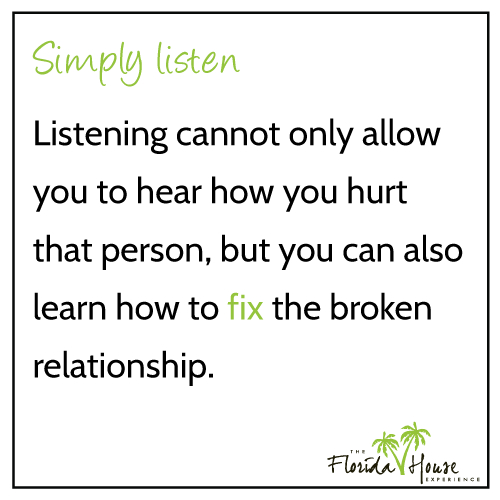
Drug addiction takes away who you are before you are even aware that it is occurring. Piece by piece, each aspect of a person’s life is neglected as the substance becomes a priority, often leading to relational issues between the user and their family members and friends. Users may begin to sneak around, lie often, and destroy the bond of trust between themselves and their loved ones.
When physically and emotionally dependent on substances, it is almost impossible to visualize what life would be like without them. Drug rehab centers provide multiple levels of care to those who need help recovering from addiction and teach them how to achieve a life without substances.
Choosing to move forward from your past by accepting the help that is readily available is the first step to rebuild trust with your family and loved ones again. Let’s take a look at some of the ways that you can rebuild trust within your family after going to drug rehab.
Set Realistic Expectations
 Someone that is recently sober might feel good about the progress that they have made, and they absolutely should, too. Getting sober is no easy task, so it is important to take pride in going through the necessary steps to freedom from substances. However, they may be so focused on the progress that they are making that they might even forget about how they acted while they were still using and the effects that it had on others around them, like their family.
Someone that is recently sober might feel good about the progress that they have made, and they absolutely should, too. Getting sober is no easy task, so it is important to take pride in going through the necessary steps to freedom from substances. However, they may be so focused on the progress that they are making that they might even forget about how they acted while they were still using and the effects that it had on others around them, like their family.
When repairing relationships after drug rehab, it’s important to remember that just getting sober doesn’t make everything go away. You will have to work to rebuild trust within those relationships again. Setting realistic expectations and knowing that nothing can change overnight can be a great way to go about the rebuilding process. Remember that you cannot control others’ behaviors, but only your own. Understanding this and taking responsibility for your actions can be key to your reconciliation.
Be Patient
Part of setting realistic expectations is remembering to be patient. As we touched on above, nothing is going to be fixed overnight and it’s important to remember that. After trust has been broken (in many cases several times), the recovery process is usually a lengthy one.
It’s important to remember that when you were suffering from addiction, you did whatever you needed to do to keep using. That might have included lying, cheating, or even stealing from family members and loved ones. Just because you have gotten sober, doesn’t mean that those family members and friends aren’t going to be apprehensive around you right away. It’s okay though because as long as you continue to stay sober, you will eventually earn their trust back. Just be patient and trust the process as you continue rebuilding your life in sobriety.
Learn Healthy Communication Methods
 One of the best ways to help build a positive relationship back with those you hurt during your addiction is to simply listen. While many people around you might have expressed their concerns to you while you were using, you probably weren’t in the right frame of mind to listen to them. Your focus was on getting your next fix.
One of the best ways to help build a positive relationship back with those you hurt during your addiction is to simply listen. While many people around you might have expressed their concerns to you while you were using, you probably weren’t in the right frame of mind to listen to them. Your focus was on getting your next fix.
Listening cannot only allow you to hear how you hurt that person, but you can also learn how to fix the broken relationship most of the time. In many situations, the person is telling you how you can remedy the situation, you just have to actively listen in order to figure out how. Not to mention, friends and family will feel more comfortable about expressing themselves directly with you if they feel they will truly be heard.
On the other side of that, learning how to better communicate allows you to stay calm should a conversation go south. Let’s face it, not everyone is going to be willing to just forget about what happened when you were using. Some won’t be as understanding as others and hurtful words might be said. It’s important in those situations to know what to do to diffuse the situation. Effective communication techniques lower the risk of getting into petty disputes. Knowing what to do can help to either remedy the situation, or you can withdraw from the conversation all together before it escalates further.
Eliminate Unhealthy Relationships
Chances are when you were using you made some “friends”. It’s important to know who is a real friend and who isn’t. The people that you had in your life while you were addicted to drugs and alcohol probably aren’t really your friends, especially now that you are pursuing sobriety. They were with you because you all shared the common goal of getting high or drunk. Continuing to hang around those people after a person has gotten sober will only provide unnecessary temptation to start using again. It is important to learn to cut out toxic relationships after drug rehab.
Codependent people are people that those in drug rehab should tend to stay away from as well. It’s natural for some people to want to look after their family member that is in recovery. It’s even natural to want to shield that person from future temptations or actions. However, this isn’t healthy for either party.
Part of the recovery process is learning to accept the past and deal with the consequences. It’s also important to be able to face the “demons” and learn how to handle them. Having someone around that is constantly trying to shelter someone in recovery isn’t doing themselves any good and they aren’t helping the person that is in recovery either.
Recovery Can Help Repair Relationships
If you have already gone through drug rehab and are on the road to recovery, you are on the right path to regaining trust with your family. Accepting the help and remaining teachable in this process is critical for you to maintain long-term sobriety.
Do not give up hope no matter how much time and effort it takes to regain all that was taken during your addiction. Rewrite your story without substances, give it a fair chance, and see how far life will take you without them. Many people have lost the battle with addiction by giving up too soon and, in reality, lives will continue to be lost if the help is not accepted. There is a chance to recover and rebuild what life looks like with your family and with others as well.
Are You Looking for Drug Rehab?
Too many families have lost their loved ones because of an addiction, and there is no discrimination with whom it grabs a hold of. If you or a loved one are in need of drug rehab, we are the helping hand you need to grasp. At FHE Health, we have all of the tools needed to live your life free from addiction. Choose life and contact us today at (833) 596-3502. Our compassionate team of counselors are standing by 24/7 to take your call.






